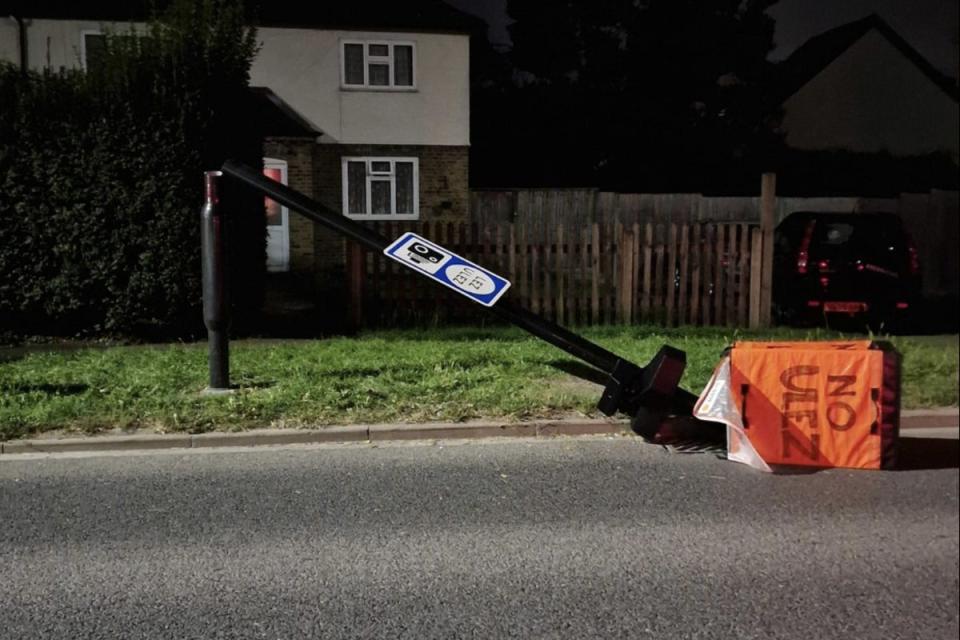Ulez expansion: London’s green dream comes alive

Sadiq Khan’s controversial Ulez expansion launched on Tuesday bringing five million more Londoners into the clean air zone — as a fresh war of words erupted between campaigners and critics of the scheme.
The Labour Mayor and environmental advocates hailed what is set to be the “biggest, strongest ultra-low emission zone” of its type in the world.
But opponents argued it will put a further financial burden on the poorest during a cost-of-living crisis as drivers with older vehicles in outer boroughs now face a £12.50 daily charge.
Mr Khan has had to see off a High Court challenge from five Tory councils and rejected calls from his own party’s MPs to rethink the expansion.
Amid the backlash, fresh pictures emerged on Tuesday of Ulez cameras being knocked over, while others appeared to have been vandalised. Videos have been posted online showing people, who describe themselves as Blade Runners, cutting camera wires or completely removing the devices.
Scotland Yard said it was investigating hundreds of reports of damaged or missing surveillance equipment in the lead up to the expansion. In its last update the Met said it had received reports of approximately 164 cameras being stolen, 185 cables being damaged, and 38 cameras being obscured.

Mr Khan defended the scheme, saying that it was desperately needed to clean up London’s toxic air.
He told the Evening Standard: “Children are growing up with stunted lungs, adults are developing asthma, cancer, heart disease and dementia, and dirty air is responsible for thousands of early deaths in our city.”
But his Conservative rival said it would be the poorest who would bear the brunt of the costs. “The best way to tackle air pollution is to take targeted, local action where the problem is greatest,” Tory mayoral candidate Susan Hall said. She has vowed to scrap the Ulez expansion if she is elected Mayor next May.
Its widening has become a deeply political issue over the last several months, being blamed for Labour’s failure to win the Uxbridge and South Ruislip parliamentary by-election in July.

Hillingdon councillor Steve Tuckwell, whose campaign focused solely on opposition to the Ulez, retained Boris Johnson’s old seat for the Conservatives.
He told the Standard: “Our local community, and countless across London getting roped into this shambolic scheme, are dead against it.
“Not because we don’t want clean air, as Sadiq keeps trying to spin. But we don’t accept that taxing the lowest earners is the right way to go about it.”

Transport Secretary Mark Harper accused Mr Khan of a “money-making exercise” and claimed that City Hall was looking at other ways to penalise motorists.
He said he did not have the power to stop the Ulez expansion, but the Government would back an amendment, put forward by Tory peer Lord Moylan, that would require London councils to support any future proposed road-charging schemes.
Mr Harper told LBC: “If you look at the Mayor of London’s own website, he wants to roll out more road user charging schemes, pay-per-mile schemes across London.” Mr Khan denied he had any plans for a pay-per-mile scheme and accused Mr Harper of making “factual errors”. “If this was about making money, I’d have acceded to the demand from the Government to expand the congestion charge much wider than it currently is,” he said. “That would have been a cash grab, but I said ‘No’.
“If it was a cash grab — as the Government is saying — just to raise money, I’d have acceded to their demand to expand the Ulez without proper consultation and a proper scrappage scheme. This is about helping our air be cleaner.”
TfL says nine out of 10 cars seen driving in outer London on an average day meet the Ulez standards, so will not be liable for the charge. All Londoners have access to the City Hall funded £160 million scrappage scheme, which provides drivers with grants to replace their non-compliant vehicles.
Environmental campaigners today backed City Hall. Simon Birkett, founder of Clean Air in London, said: “We know that low emission zones work. The Mayor has shown that two earlier phases of the Ulez in central London and inner London have dramatically reduced NO2 concentrations along roadsides. These roadsides are where the most economically-deprived people often live and many others work.
“The greatest lesson from the Great Smog, more than 70 years ago, is that big problems need big solutions.”

 Yahoo News
Yahoo News 
